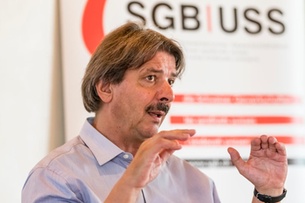Swiss Trade Union Federation President Paul Rechsteiner, pictured, said unions would go as far as forcing a referendum to ensure that Switzerland protects wages autonomously. (Keystone) Switzerland’s largest national trade union centre has refused to participate in discussions led by Swiss Economics Minister Johann Schneider-Ammann on easing measures for wages and working conditions as part of framework negotiations with the European Union (EU). At a press conference in Bern on Wednesday, the Swiss Trade Union Federation affirmed that it will not negotiate on the relaxation of measures relating to the free movement of people, citing concern over the weakening of Swiss salary protections. The Federation said that
Topics:
Swissinfo considers the following as important: 3) Swiss Markets and News, Featured, Johann Schneider-Ammann, newsletter, Paul Rechsteiner, Politics, Swiss Trade Union Federation
This could be interesting, too:
RIA Team writes The Importance of Emergency Funds in Retirement Planning
Nachrichten Ticker - www.finanzen.ch writes Gesetzesvorschlag in Arizona: Wird Bitcoin bald zur Staatsreserve?
Nachrichten Ticker - www.finanzen.ch writes So bewegen sich Bitcoin & Co. heute
Nachrichten Ticker - www.finanzen.ch writes Aktueller Marktbericht zu Bitcoin & Co.

Swiss Trade Union Federation President Paul Rechsteiner, pictured, said unions would go as far as forcing a referendum to ensure that Switzerland protects wages autonomously. (Keystone)
Switzerland’s largest national trade union centre has refused to participate in discussions led by Swiss Economics Minister Johann Schneider-Ammann on easing measures for wages and working conditions as part of framework negotiations with the European Union (EU).
At a press conference in Bern on Wednesday, the Swiss Trade Union Federation affirmed that it will not negotiate on the relaxation of measures relating to the free movement of people, citing concern over the weakening of Swiss salary protections.
The Federation said that while the Swiss government had stated in July that it would not cross “red lines” it has set regarding worker protections, the mandate of the economics ministry contradicts all decisions made until this point. Specifically, it argued, if the ministry’s working group adjusts measures regarding the free movement of people in accordance with EU critiques, pressure on wage protections in Switzerland will increase.
“We will take all measures – up to forcing a referendum – to prevent a possible reduction of the protective measures,” Swiss Trade Union Federation President Paul Rechsteiner said, according to Reuters.
Eight-day rule
The measures for the free circulation of people are the main stumbling block in negotiations on a framework agreement between Switzerland and the EU. The latter has pushed back especially against the so-called eight-day rule, which requires European businesses to announce one week in advance their missions to Switzerland and to pay a deposit. The EU wants Switzerland to abandon the rule in favour of a new directive on European posted workers.
The Federal Council, Switzerland’s executive body, decided at the beginning of July to consult the cantons and trade unions on the matter, and mandated the economics ministry to organise the discussions with the foreign affairs and justice ministries.
Economics minister responds
At an impromptu press conference on Wednesday evening, Economics Minister Schneider-Ammann responded to the boycott announcement, calling the Federation’s attitude “unacceptable”.
“I must work with those who are ready to continue discussions; I engage with those who come to my table,” he said, adding that he intends to continue with the mandate given to him by the Federal Council with the goal of finding a solution by October, before the implementation of Brexit.
The economics minister reaffirmed that no “red lines” would be touched, saying that employment remains a government priority, and that wages will not be sacrificed. He emphasised the importance of good framework conditions in Switzerland so that companies will invest there.
SDA-ATS/Reuters/clTags: Featured,Johann Schneider-Ammann,newsletter,Paul Rechsteiner,Politics,Swiss Trade Union Federation
